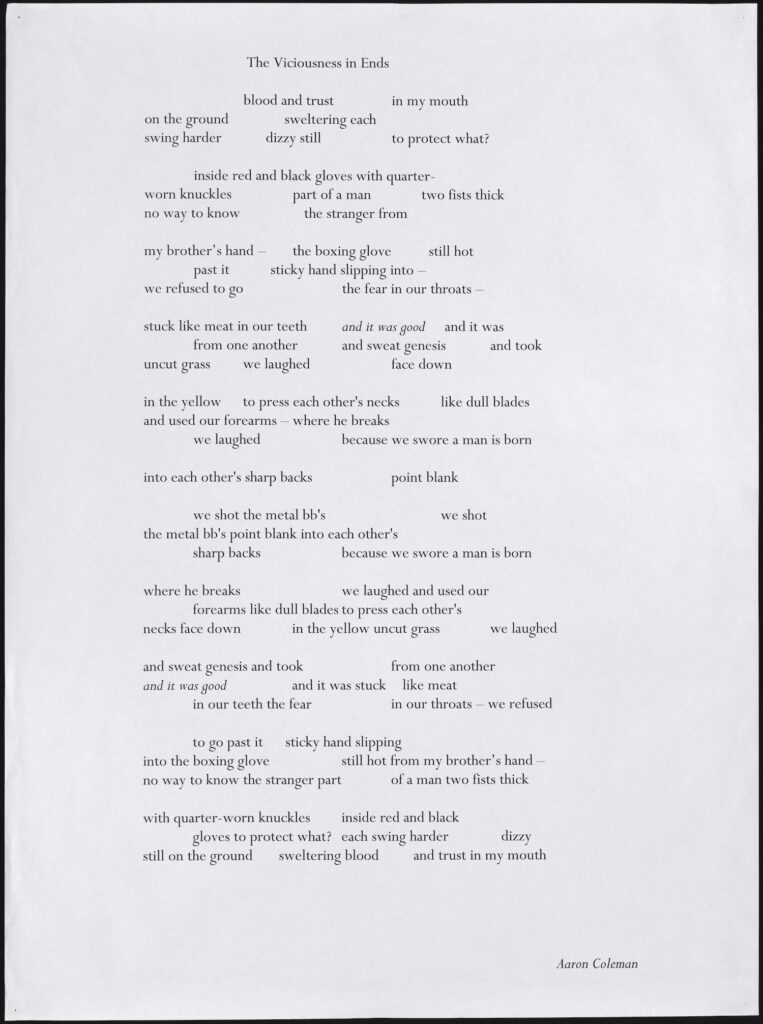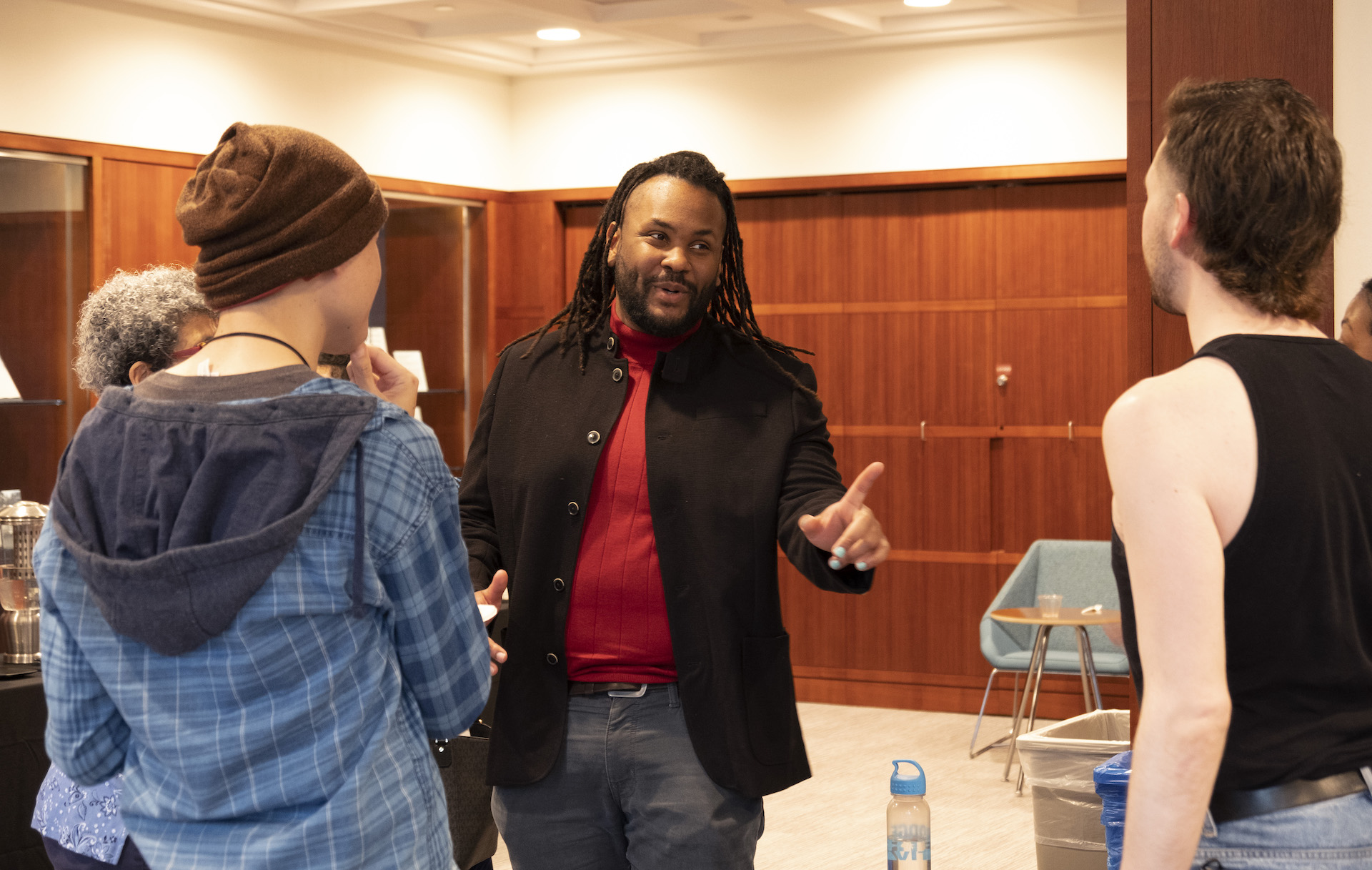
A Reading and Conversation with Poet Aaron Coleman
On April 3 and 4, Washington University Libraries hosted poet, translator, and Washington University alumnus (MFA ’15, PhD ’21) Aaron Coleman for two special events, cosponsored by the Center for Literary Arts, the Program for Comparative Literature, the Department of English, and the Writing Program. The Libraries’ Julian Edison Department of Special Collections acquired Coleman’s literary papers in the summer of 2021, and the events—along with the Wherein I Am exhibition—commemorated the opening of his papers for research.
The events had an additional celebratory air since Coleman hadn’t been on campus since the pandemic began. Many professors and colleagues, and friends from the community at large came to the event to catch up with Aaron and congratulate him. You can listen to the audio recordings of both the poetry reading and the conversation with English professor Mary Jo Bang.
To start the first event, held in the Mendle Room of Olin Library, Head of Special Collections Joy Novak welcomed everyone. Then, Associate Professor of Comparative Literature and Spanish Ignacio Infante, who was also Coleman’s dissertation advisor, gave the introduction, saying that “working with Aaron has been one of the highlights of my time here, as a teacher, as a reader of his poetry, as a fellow translator, as a friend and colleague.”
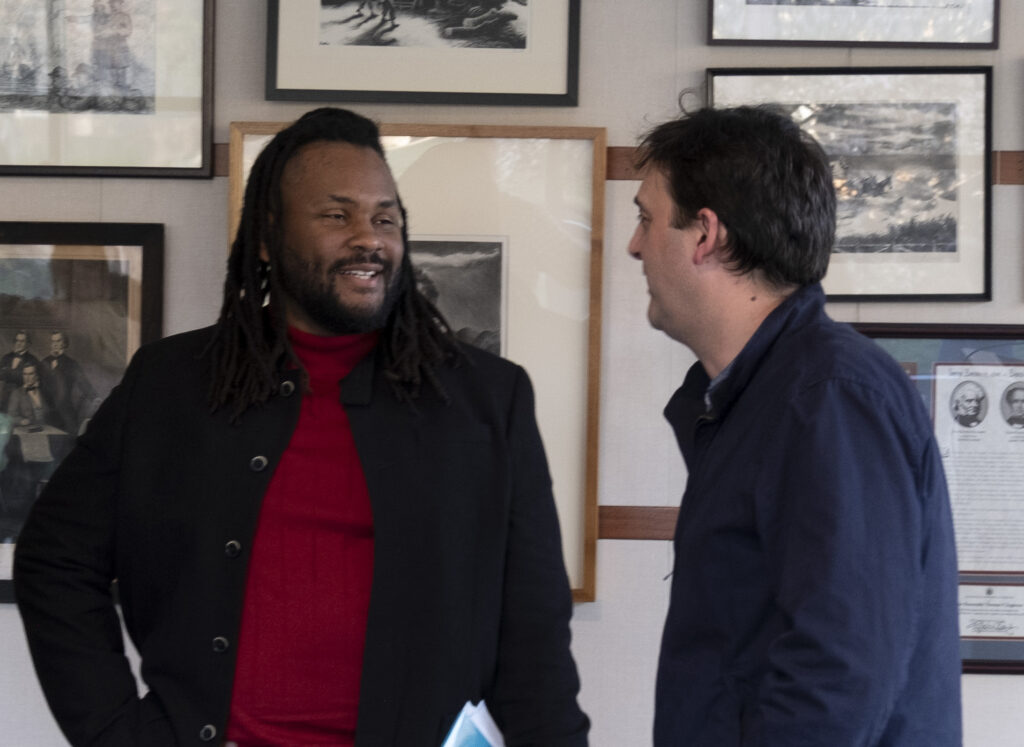
Coleman started the reading with a tribute to a “cohort” of his in the MFA program who has since passed away, Kathryn Hindenlang, by reading her poem, “This is the Nature.” Next, he prefaced and read “Manmade Shelter Beneath the Rupturing Sky” and “On Acquiescence,” from Threat Come Close (Four Way Books, 2018), “the book that was born here,” as he put it. Then came a poem dedicated to St. Louis, “In the City of Tenderness and Desperate Promises,” and a poem inspired by the first time he experienced seeing young Black men crying “tears of joy and something else” on television during the 2019 NBA draft, titled, “Draft Night: Nautical Brothers Association.”

Coleman returned to poems from Threat Come Close, starting with a triad having titles of invented saints: “St. Trigger,” a poem printed in a landscape orientation, which benefited from the workshop experience, “St. Inside and Out,” and “St. Who.” Coleman mentioned the repeating saints in the book, reflecting on the relationship to religions that were forced upon Black people during slavery, which, in part, inspired him. Before starting the dictionary-form poem “Through,” Coleman explained how it represents a connection between his time in the MFA program and the comp lit PhD program.
The palindrome poem “The Viciousness in Ends” was prefaced with commentary on its importance to him in representing memory and was followed by “Too Far North.” Coleman then paused the reading to give more extended gratitude to the many people and programs who influenced and helped him during his years here and whom he was not able to thank at the time of his graduation.
Coleman closed with a newer poem, “The Bright River We Keep” which will be in his forthcoming book, Red Wilderness (Four Way Books, 2024). This was followed by audience Q&A, including thoughts on Red Wilderness, the connections between poetry and translation, and how being an educator fits into his work as a poet and translator. After the program, the audience was invited to view the exhibition in the special collections reading room and to the reception in the Ginkgo Room.
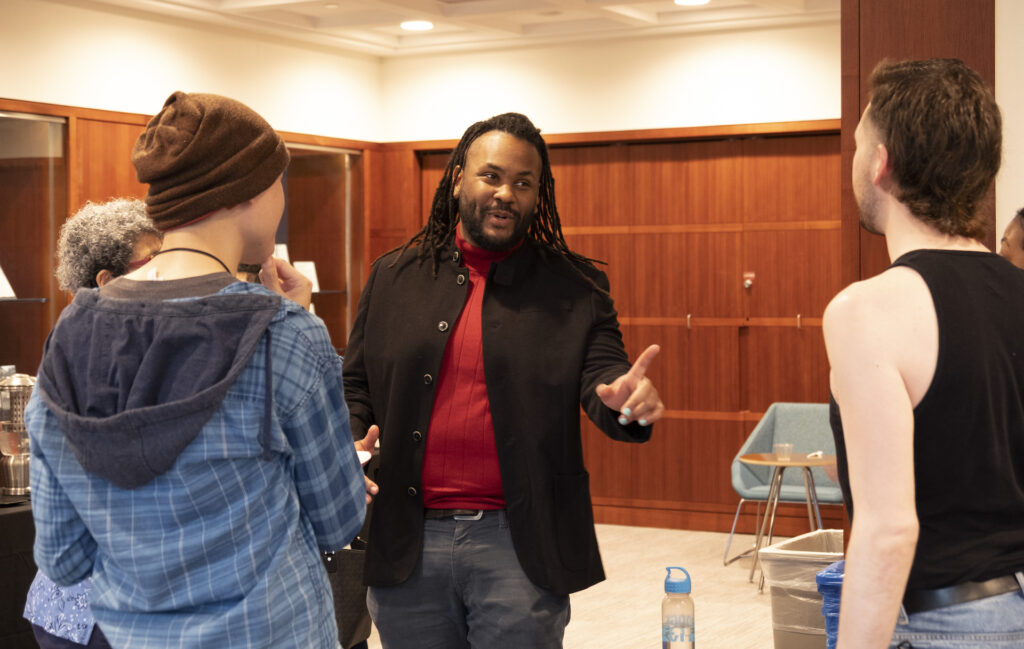
The next evening the Libraries hosted Coleman and Mary Jo Bang in conversation in Olin Library. Associate University Librarian for special collections Nadia Ghasedi welcomed the audience. Bang, who was a mentor of Coleman’s in the MFA program and whose literary papers are also in the Modern Literature Collection, started off with her thoughts on belonging as a theme of the poems in Threat Come Close—being a person and being a person in a place.
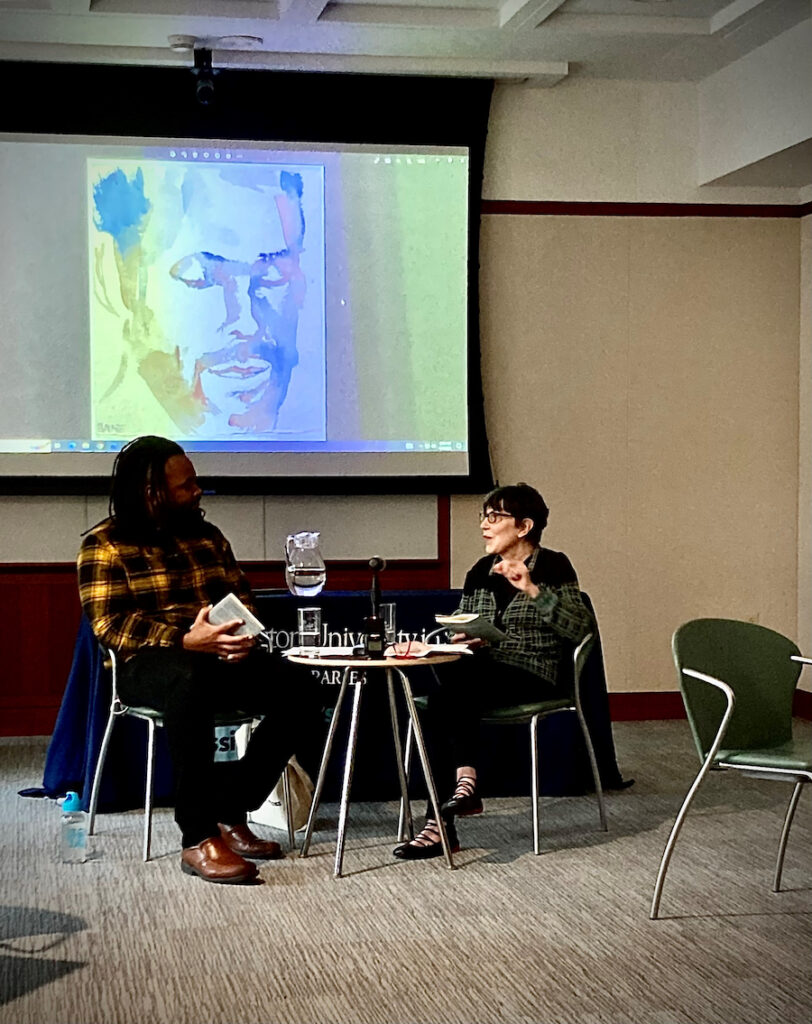
As Bang and Coleman conversed, scans of selected items from Coleman’s papers and the exhibition showed on a screen behind them, and they focused on the image of the watercolor of Coleman by Elaine Goble Dandridge as representative of his connections to the art and poetry communities of WashU and St. Louis. They then discussed Coleman’s decision to include it in his papers for others in the poetry MFA and comparative literature PhD programs to find uses for rather than keeping it for himself because of its sentimental value. Regarding his decision-making process, Coleman said: “I thought about this as a way to speak to the totality of the time and various parts of my life here. I’m giving it up in some ways but also letting it bloom into something else.”
They discussed the “I Am a Man” poster, which Coleman carried during the protests in Ferguson, Missouri, after the killing of Michael Brown in 2014. Coleman shared how it changed his relationship with the city and the effect it had on him as a person and a poet. Bang tied this to the prevalence of “I Am” and belonging throughout Threat Come Close. Coleman expounded on this idea and read “Wherein I Am” to help illustrate it. He then talked about his relationships with different places as “home” and how those relationships change.
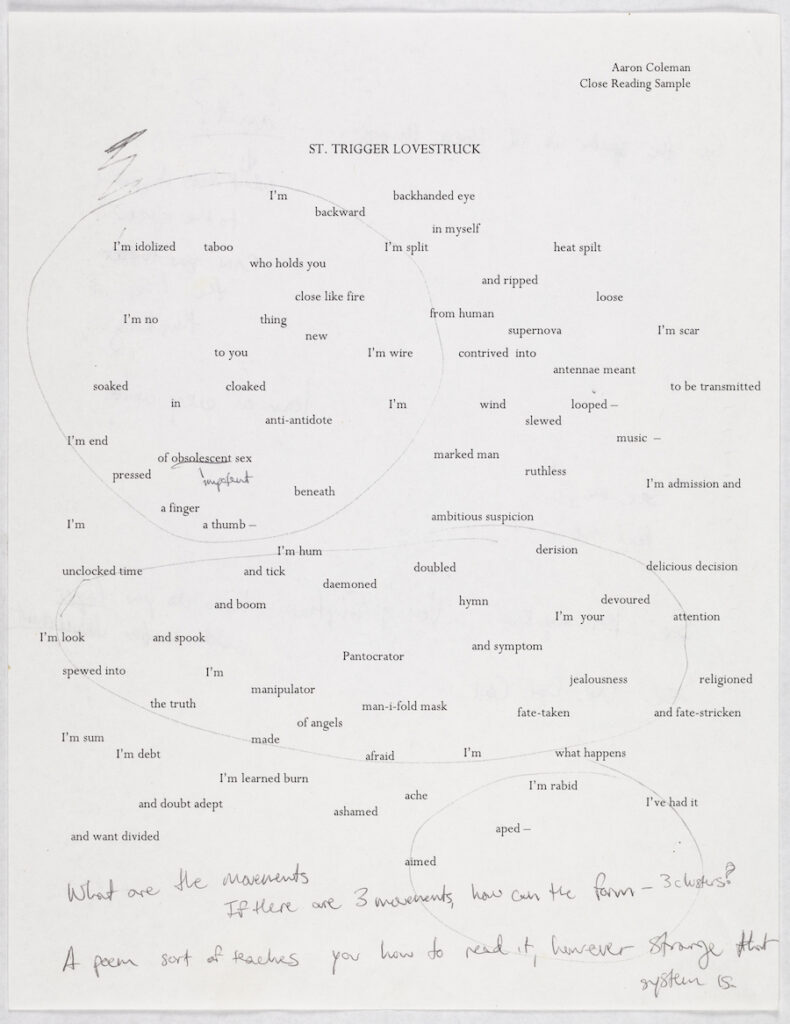
The topics of translation, Iola Leroy, the history of slavery, and poetry revisions were touched upon using his draft of “Iola Leroy, or Shadows Uplifted.” For an evaluation of the evolution of “St. Trigger,” the audience received photocopies of a draft in the exhibition and the finished poem. The conversation then shifted to Coleman’s journey to translation and his community of translators while in the comp lit PhD program. Bang invited Coleman to talk about his current translation project of Nicolás Guillén’s The Grand Zoo, and to reflect on the writing of his dissertation.
The event wrapped up with audience Q&A, including more discussion of translation and the relationship of music to his poetry. After the conversation, there was another opportunity to view the exhibition, and a chance to have books or exhibit postcards signed and inscribed by Coleman.
For some quotes from these recordings along with more photos of Coleman taken during his visit to campus, see Aaron Coleman’s #FacesofWashU feature on Instagram.

